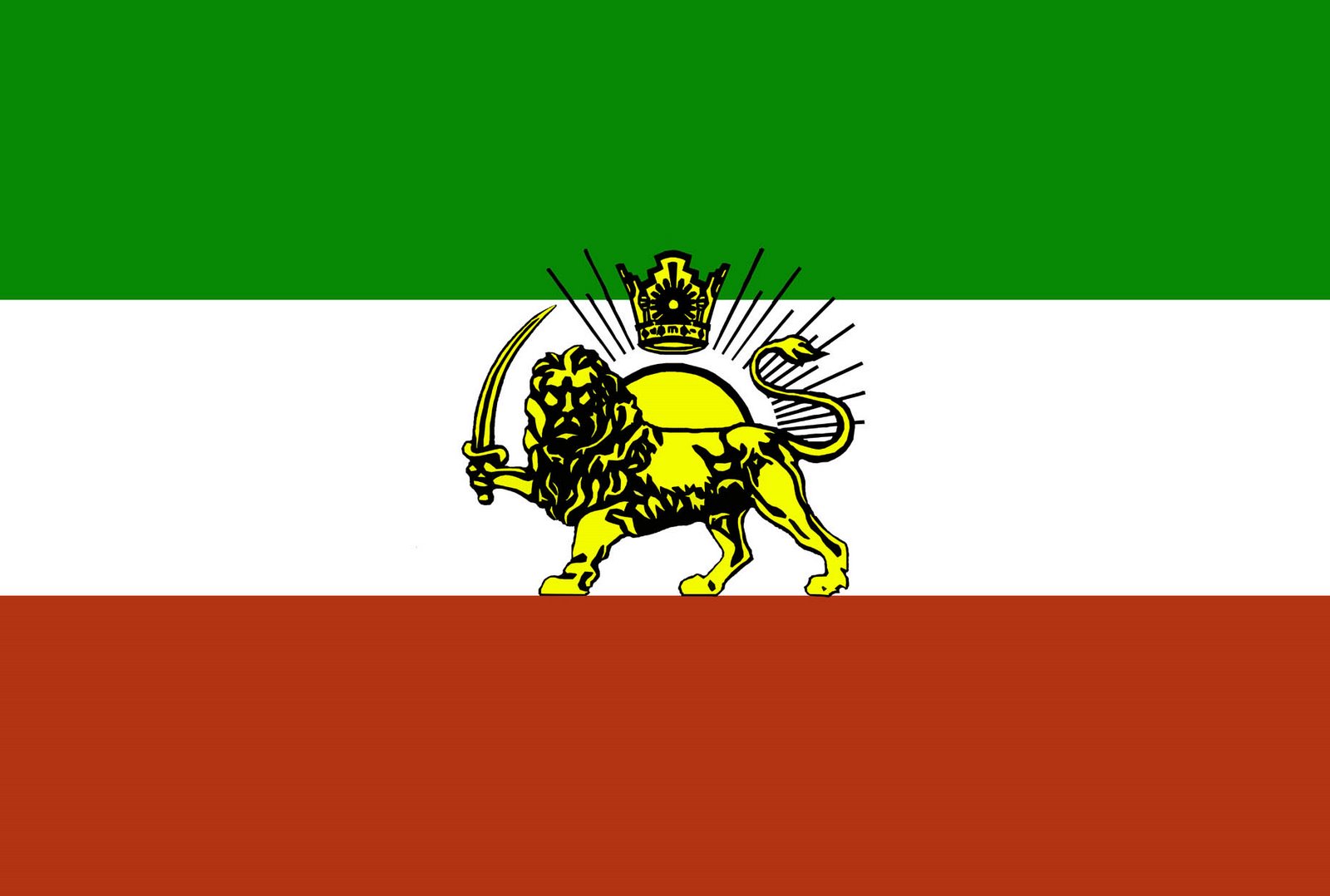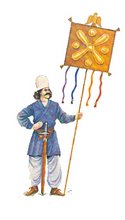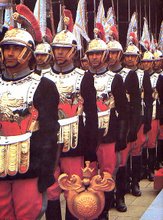A lot of falsehood surrounds the issue regarding the removal of PM Mossadegh of Iran. Some have absurd claims that the CIA paid a crowd of a few hundred to overthrow a so-called "popular" Prime Minister! Since these falsehoods seem to have received more exposure than what the accounts of those who actually witnessed and were involved in the events I'd like to post two accounts here regarding this topic - one by former Imperial Ambassador Ardeshir Zahedi and the following by HIM Empress Farah Pahlavi. You be the judge on WHAT REALLY TOOK PLACE.
Just a note to make is that I believe Dr Mossadegh's efforts in nationalizing Iranian oil were very noble (before him Dr Razmara had initiated the process but he was killed by Islamists) but the the process was not handled in a rational and professional manner which primarily took into consideration the national security of the country - this mistake lead to the downfall of Dr Mossadegh's government coupled with the appeasement of the Tudeh (Communist) Party which took place during the Premiership of Dr Mossadegh. People still remember him as a great nationalist for nationalizing Iranian oil but looking at it rationally, without any emotions involved , the way it was handled hurt Iran much more than it benefited the country.
And for those "Mossadeghists" who claim that Dr Mossadegh was against the Shah the truth is that the late PM was a Constitutional Monarchist himself who favored a Constitutional Monarch that reigned and did not rule - he was never against the abolishment of the centuries old Iranian Constitutional Monarchy - there is nothing more to that.
********************
THE CIA AND IRAN - WHAT REALLY HAPPENED
Ardeshir Zahedi
http://www.ardeshirzahedi.org/cia-iran.pdf
http://www.ardeshirzahedi.org/main.html
On 16 April 2000, the New York Times published a story on what was presented as a “secret report” by a CIA operative concerning the events of August 1953 in Iran,. The following article is written in the interest of historical truth and attempts to put those fateful events in Iran into prospect perspective.
At this time when the future of relations between Iran and the United States is, once again, debated in public, it is important both sides steer clear of myths that have fostered so much misunderstanding between them.
One such myth has been woven around the claim by a few CIA operatives that they hatched a plot to get rid of Prime Minister Dr. Muhammad Mossadegh in August 1953 and (propelled my father, the later General Fazollah Zahedi into power with the Shah’s blessings.) That claim, first made in the early 1960’s and never corroborated by any hard evidence, has over the years found a niche in the historical folklore of both nations. In a recent feature the New York Times gave the claim fresh publicity, relaunching the debate over what actually happened in Iran in those remote days of the Cold War.
Victory, of course, has a thousand fathers while defeat is an orphan. Had the August 1953 efforts to remove Mussadeq from office failed, there would have been no CIA ''heroes'' claiming the credit.
There is a mass of evidence, including US and Iranian official documents and testimonies by people who played a role in the events that give the lie to the CIA operatives’ claim. Briefly, what happened in August 1953 was as follows: the Iranian political establishment was divided between supporters and opponents of Mossadegh. Mossadegh’s opponents looked to the Shah for a rallying point. My father who had served as Interior Minister in Mossadegh’s Cabinet has broken with him and established himself as the leader of the anti-Mossadegh faction.
The Shah was thus under pressure from many powerful circles and personalities inside Iran to dismiss Mossadegh and name my father as the new prime minister. Mossadegh recognized my father as his chief adversary at the time and did all he could to break him.
Mossadegh had been abandoned by many of his former colleagues, among them such personalities as Hussein Makki and Mozzafar Baqai, and opposed by parties that had provided the backbone of his support in 1951.
The most prominent members of the Shiite clerical establishment, including the Ayatollahs Borujerdi, Hakim, Shahresetani and Kashani were solidly opposed by Mossadegh and wanted the Shah to remove him. They were all in contact with my father and supported him in their struggle against Mussadeq.
A leading member of the Majlis (parliament) Hassan Haeri-Zadeh, who had been one of Mossadegh’s strongest supporters until then, even cabled the United nations secretary general to appeal for help against Mossadegh’s increasingly despotic rule.
The Shah had already clashed with Mossadegh’s in 1952 and forced the ''doctor'' to resign as prime minister. At that time, however the ''politics of street'' had turned against the Shah and he had been obliged to reinstate Mossadegh. In August 1953 the tide had turned against Mussadeq who had further undermined his own position by disbanding the parliament elected under his own stewardship.
The rest is history, as the saying goes. Or is it?
It is quite possible that the CIA and its British counterpart were engaged in the usual dirty tricks campaign in Tehran. Tehran had become one of the hottest ''theaters'' of the Cold War with the Soviet Union enjoying a strong presence through a mass Communist Party (the Toodeh), several front organizations and at least four daily newspapers. The Communists had also infiltrated the armed forces and the police, recruiting over 700 officers and NCOs.
What is certain is that Mossadegh’s fall was not due to any dirty tricks that the CIA might have played. Nor did the CIA have the kind of access its operatives claim to have had to the key figures of the revolt against Mossadegh including my father. The only time my father visited the US embassy in Tehran was a function in honour of Averell Harriman on 4th of July 1951, and in his capacity as interior minister, Harriman had come to Tehran with a mission from President Harry Truman to persuade Mussadeq to find a way out of the crisis over the nationalization of Iranian oil. (Cf. Vernon Walters in ''Silent Missions'').
My father never had any meetings with any CIA agents. One operative has claimed that he spoke to my father in German, ostensibly during secret meetings. The fact is that the only foreign languages my father ever spoke was Russian and Turkish, not German or English.
Iranian history remembers my father as a true patriot who wore the wound he had won in battle like so many badges of honour. Fazollah Zahedi had fought for virtually every inch of what he regarded as the sacred land of Iran, against a Bolshevik-sponsored regime along the Caspian coast to a British sponsored secessionist movement in the oil rich province of Khuzestan. During the Second World War had become a war prisoner of the British and sent into captivity and exile in Palestine, then under British mandate. Fazollah Zahedi was always big enough to fight his own fights, backed by his own loyal friends. To try and portray such a giant of Iran’s contemporary history into a bit player in a scenario fit for ''Mission Impossible'' requires a degree of cynicism that only frustrated egomaniacs might master.
Throughout the dramatic events that led to the fall of Mussadeq, I was at my father’s side as one of his principal political aides .Had he been involved in any foreign intrigue I would have known, he was not.
Loy Henderson , the US ambassador to Tehran at the time, makes it abundantly clear in his dispatches to the State Department that Mussadeq was overthrown by a popular uprising which started from the poorest districts of the Iranian capital. Henderson’s reports have been published in a book of more than 100 pages, translated into Persian and published in Iran.
The Iranian public, therefore, has a more balanced view of the events than its American counterpart which is fed recycled claims by former CIA operatives. British and Soviet accounts at the time also make it clear that Mussadeq had fallen victim to his own hubris which antagonized his allies and forced the Iranian people into revolt.
More than 100 books, by Iranian and American scholars, give the lie to the CIA operatives ''self-congratulatory'' account.
Barry Rubin writes “It cannot be said that the United States overthrew Mussadeq and replaced him with the Shah… Overthrowing Mussadeq was like pushing an open door.”
Gary Sick writes ''The belief that the United States had single-handedly imposed a harsh tyrant on a reluctant populace became one of the central myths of the relationship, particularly as viewed from Iran.''
Amir Taheri writes “What happened was not a successful conclusion of a (CIA) conspiracy but a genuine uprising provoked by economic hardship, political fear and religious prejudice.”
Richard Helms, long time CIA director, told a BBC television program that '' the agency did not counter rumours of in Iran because the Iranian episode looked like a success. At the time, of course, agency needed some success, especially to counter fiascos as the Bay of Pigs.''
Even Donald Wilber, the CIA operative whose ''secret report'' has been given top billing by the New York Times makes it clear that whatever he and his CIA colleagues were up to in Tehran at the time simply failed.
Wilbert writes:'' headquarters spent a day featured by depression and despair… The message sent to Tehran on the night of August 18 said that the operation has been tried and failed and that contrary operations against Mussadeq should be discontinued.''
Mossadegh was overthrown on 19 August when hundreds of thousands to Tehranis poured into the streets to demand his departure and the return of the Shah. This was not a military ''coup d’etat'' since there was no change in the constitution or any of the structures of the Iranian state. Nor was the Shah’s position as head of state affected. Under the constitution of 1906 the Shah had the power to name and dismiss prime ministers. He simply exercised that power by dismissing Mossadegh and nominating Zahedi in a perfectly legal and constitutional manner… Mussadeq tried to resist his dismissal but was swept away by the masses.
The army played a supportive role in the anti-Mussadeq uprising and even then only after the people had taken the initiative. At the time my father was no longer on active service, having retired from the armed forces and engaged in political activities as a senator and leader of the anti-Mussadeq coalition. Mussadeq himself held the portfolio of Defence and enjoyed the support of many key officers of the armed forces, including the Chief of Staff appointed by himself.
Anyone who had studied the history of the turbulent years would also know that Mossadegh was the most pro-American senior politician Iran had produced. He was the darling of the Truman Administration which raised the amount of aid to Iran, distributed through Point IV, from half a million dollars to 23 million dollars. On August 18, 1953, a day before Mussadeq fell, Henderson met Mussadeq and offered him an emergency loan of 10 million dollars on behalf of the Eisenhower Administration.
Mossadegh himself never blamed the Americans for his downfall. He was intelligent enough to know why his political career led into an impasse.
The anti-Mossadegh coalition did, of course, look to the United States, as the leader of the Free World, to counter any ore than the soviets might have, made at the time to intervene in what was a domestic Iranian power struggle. From a geo-strategic point of view, therefore the anti-Mossadegh coalition regarded itself as part of the Free World. But does that mean that all those who fought Communism and upheld the cause of liberty throughout the Cold War were manipulated by the CIA?
Three years ago the CIA announced that almost all of its documents pertaining to the August 1953 events in Iran had been destroyed in a fire. Was someone trying to cover up the CIA’s most dramatic ''success story''? Or did the documents burn because the good ambiance created by the Iranian myth that had been fabricated by a few individuals with a lot of imagination and very little of scruples?
***************************
Empress Farah Pahlavi's response to the New York Times
Howell Raines Esq.
Editorial Page Editor,
The New York Times
229 West 43rd ST.
New York, NY 10036-3959
April 20, 2000
Dear Mr. Raines,
The article " a Secret C.I.A History" printed in the New York Times on April 16, 2000 renders a self-lauding, exaggerated, and partial account of the events of 1953. It also makes several erroneous and unfair remarks about my late husband, Mohammad Reza Shah Pahlavi. Contrary to what the so-called secret history suggests, my husband's hesitation about dismissing Premier Mossadegh did not result from his indecisiveness. The Shah had strongly supported Dr.Mossadegh in the fight for the nationalization of Iran's oil industry, agreeing with him that Iran had been systematically exploited by the British and other foreign powers. For him, the Premier's struggle to emancipate Iran's resources took precedence over all other issue save protecting the nation's independence and territorial integrity. Dr.Mossadegh misperceived the international array of economic and military powers deployed against him and Iran. He overestimated the strategic importance of Iran's oil to the Western world. The country was taken step by step to a political and diplomatic impasse. Iran's economic and social conditions deteriorated. The Communist Party grew inordinately in size and power, penetrating several critical government institutions including the armed forces. In the meantime, his former allies - the middle class, clerics, merchants, and some members of the national front renounced him.
My husband supported Dr.Mossadegh as long as possible. For several months, he resisted many members of the political elite, including several of the Premier's former allies, who insisted that Dr. Mossadegh be discharged. The Shah’s reluctance sprung partly from his wish to be certain that deposing the premier accorded with Iran's constitution. It was only when the Prime Minister arbitrarily dissolved the constitutionally elected Parliament, and the Shah was convinced that the country's national independence and territorial integrity were manifestly threatened, did he decide to dismiss Dr.Mossadegh.
To claim that the Monarchy was saved in 1953 because of the C.I.A involvement and that the late DR. Mossadegh was removed from power with a sum of money is an insult to every Iranian.
The report says that the message sent to Tehran on the night of August 18th was that " the operation has been tried and failed." The Monarchy was saved because it was the will of all Iranians. While some selected documents produced by a specific agency may indeed be conducive to the current disposition of a specific administration, it would be wrong to assume any objective observer, be it an Iranian or foreigner, base his opinion solely on such a limited account.
It is unfortunate that in an attempt to appease the current ruling clerics in Iran, the government of the United States and increasingly the media have chosen to disparage the late Shah of Iran without consideration of his pivotal role in regional and world peace and his service to his country. It is equally unfortunate that they choose to confuse the attitude of the present regime in Iran towards the United States with that of the people of Iran.
The thirty-seven years of the Shah’s reign concurrent with the administration of eight US Presidents shows a close and mutually
beneficial alliance for most of the time.
Contrary to recent statements by US officials, Iranian people never held animus toward American before or after the events of 1953. Witness the friendship Iranians extended to many American in Iran prior to the revolution and the hospitality shown to the few Americans now traveling to Iran. In the interest of the two peoples, it is essential that no one allow this misconception to cloud sound judgment.
Iran will rise from her ashes.
Sincerely yours,
Farah Pahlavi










2 comments:
Great post as usual. I wish we could some day take these people to court.
Great post. I've linked it to one post (Persianization of Islam - Part III) to expand on key events under Pahlavi dynasty & history.
Post a Comment